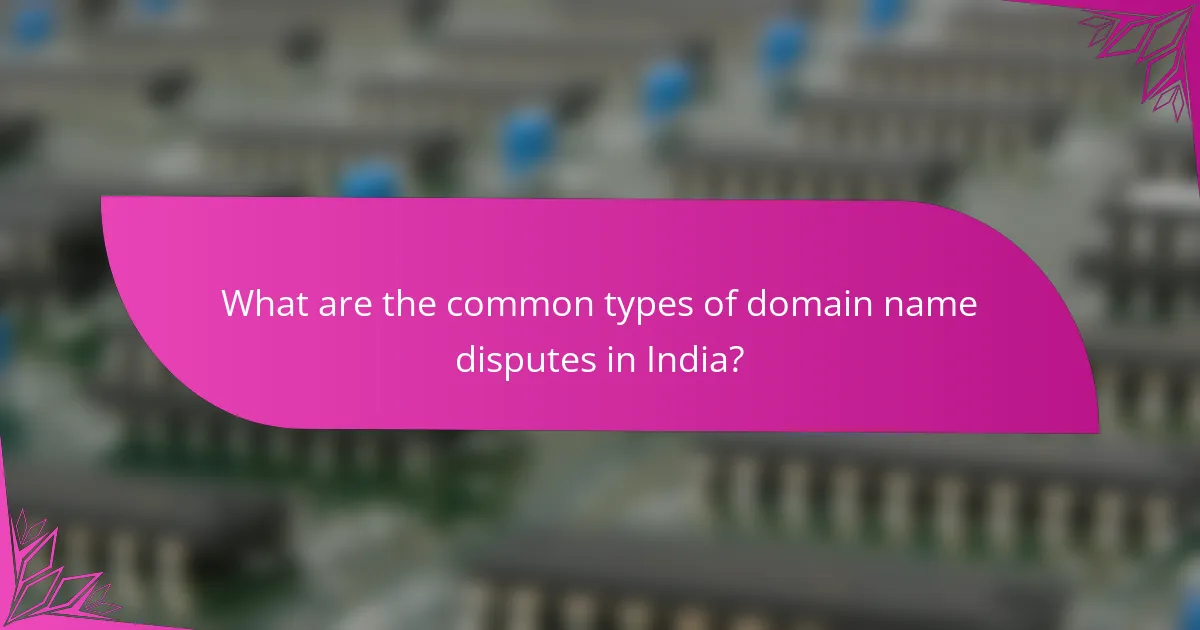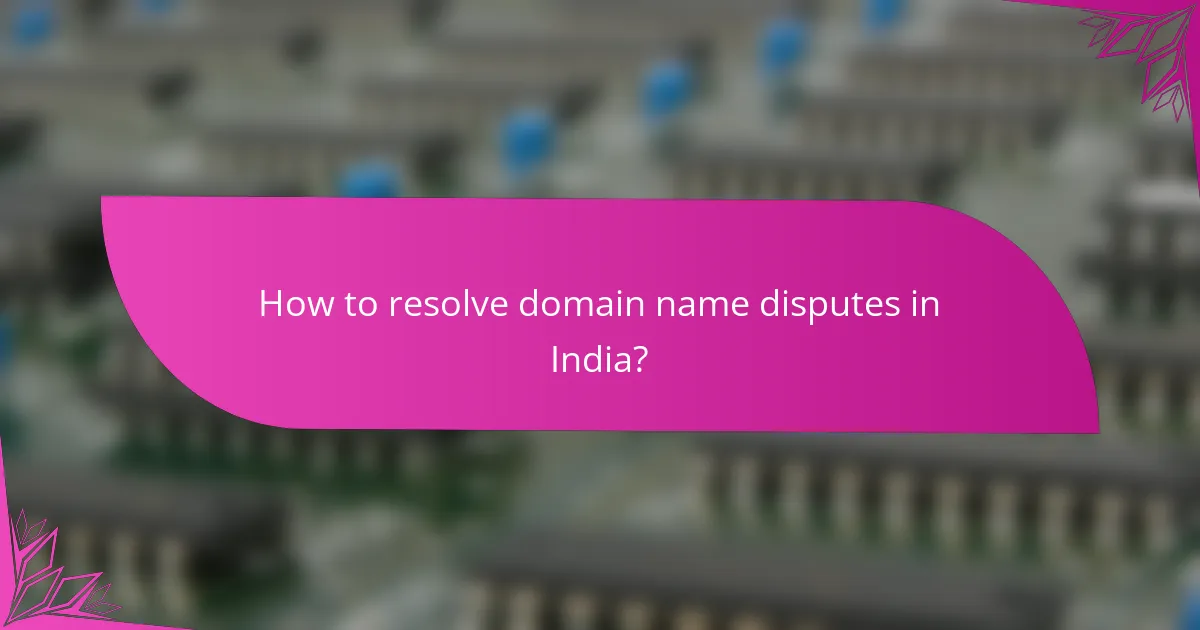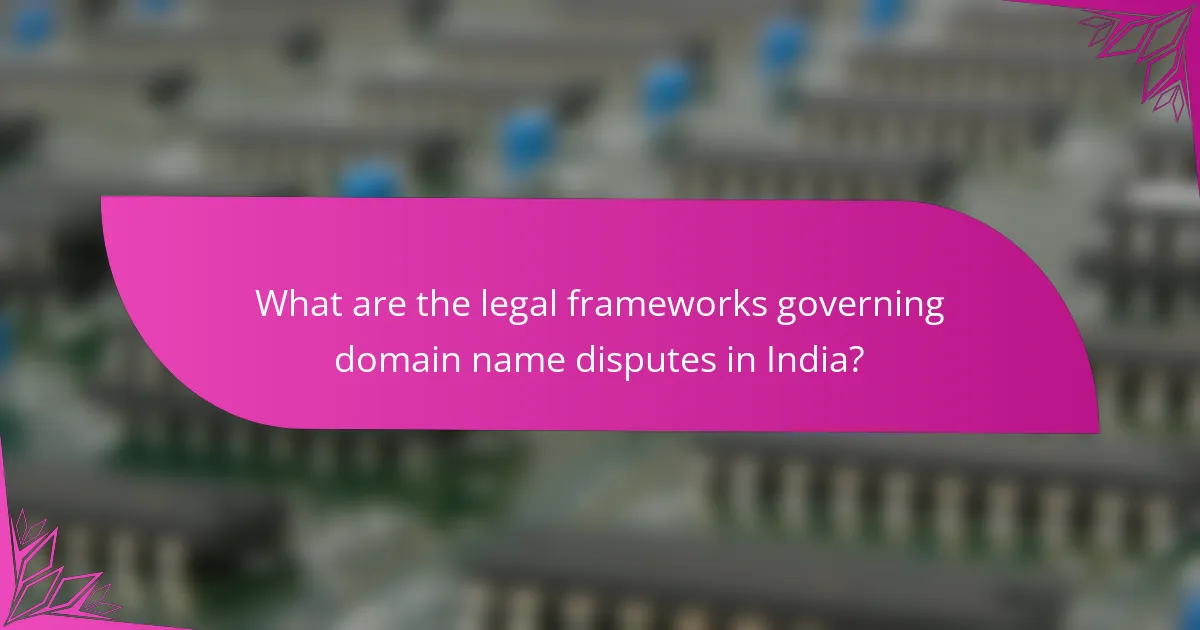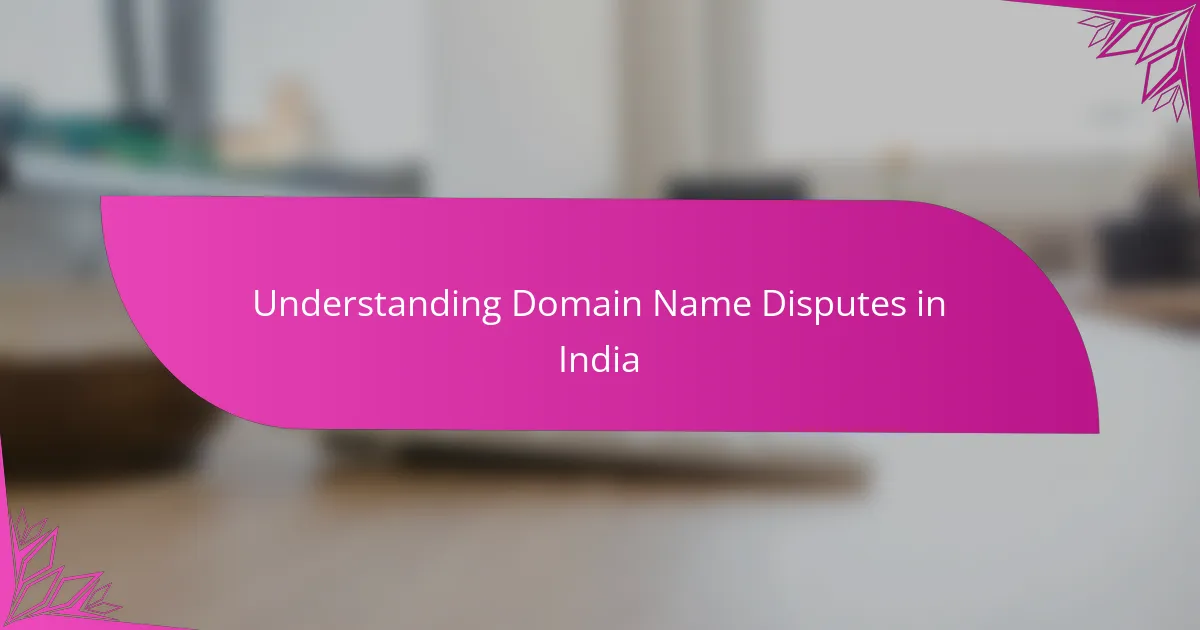Domain name disputes in India often revolve around issues such as trademark infringement, cybersquatting, and domain name hijacking, each presenting unique challenges for businesses and individuals. To address these conflicts, parties can engage in mediation, arbitration, or litigation, with each method offering different processes and outcomes. The resolution of these disputes is governed by key legal frameworks, including the Information Technology Act, 2000, and the Indian Trademark Act, 1999, which aim to protect trademark rights and provide structured dispute resolution procedures.

What are the common types of domain name disputes in India?
In India, common types of domain name disputes typically involve trademark infringement, cybersquatting, and domain name hijacking. Each of these disputes arises from different motivations and legal considerations, impacting businesses and individuals in various ways.
Trademark infringement disputes
Trademark infringement disputes occur when a domain name closely resembles a registered trademark, leading to confusion among consumers. For instance, if a business named “ABC Electronics” finds that someone has registered “abcelectronics.com,” it may claim that the domain infringes on its trademark rights.
To resolve such disputes, the affected party can file a complaint under the Uniform Domain Name Dispute Resolution Policy (UDRP) or pursue legal action in Indian courts. It’s crucial to gather evidence of trademark registration and demonstrate the likelihood of confusion to strengthen the case.
Cybersquatting cases
Cybersquatting involves registering domain names that are identical or similar to established brand names with the intent to sell them at a profit. For example, if someone registers “tatasons.com” with the aim of selling it to Tata Group, this can lead to a cybersquatting dispute.
Victims of cybersquatting can file complaints under the UDRP or the Indian domain name dispute resolution policy. It’s advisable for businesses to monitor domain registrations related to their brand and act swiftly if they detect potential cybersquatting.
Domain name hijacking incidents
Domain name hijacking refers to unauthorized access and transfer of a domain name from its rightful owner. This can happen through phishing attacks or exploiting security vulnerabilities in domain registrars. For instance, if a hacker gains access to a company’s registrar account and changes the ownership of the domain, it constitutes hijacking.
To prevent hijacking, domain owners should implement strong security measures, such as two-factor authentication and regular password updates. If hijacking occurs, the rightful owner should promptly contact the registrar and may need to seek legal recourse to reclaim the domain.

How to resolve domain name disputes in India?
To resolve domain name disputes in India, parties can utilize mediation, arbitration, or litigation. Each method has its own processes and implications, allowing for various approaches based on the specifics of the dispute.
Mediation and arbitration options
Mediation and arbitration are alternative dispute resolution methods that can be quicker and less costly than litigation. In mediation, a neutral third party helps the disputing parties reach a mutually acceptable agreement. Arbitration, on the other hand, involves a binding decision made by an arbitrator based on the evidence presented.
Both methods can be beneficial for domain name disputes as they allow for more flexibility in terms of solutions. For instance, parties can negotiate terms that may not be available in a court ruling, such as domain name transfers or co-ownership arrangements.
Filing a complaint with the Indian Domain Name Dispute Resolution Policy
The Indian Domain Name Dispute Resolution Policy (IDNDRP) provides a structured process for resolving disputes related to domain names. Under this policy, a complainant can file a complaint with an approved dispute resolution provider, which will then assess the case based on established criteria.
Key steps include submitting a complaint that outlines the grounds for the dispute, paying the required fees, and participating in hearings if necessary. This process is generally faster than traditional litigation and is specifically tailored to address domain name issues.
Litigation in civil courts
If mediation or arbitration does not yield satisfactory results, parties may resort to litigation in civil courts. This formal legal process involves filing a suit in the appropriate jurisdiction, which can be time-consuming and costly.
Litigation may be necessary for complex cases or when parties seek specific legal remedies that are not available through alternative methods. However, it is essential to consider the potential for lengthy proceedings and the need for legal representation, which can significantly increase costs.

What are the legal frameworks governing domain name disputes in India?
The legal frameworks governing domain name disputes in India primarily include the Information Technology Act, 2000, the Indian Trademark Act, 1999, and the Uniform Domain-Name Dispute-Resolution Policy (UDRP). These laws provide a structured approach to resolving conflicts over domain names, ensuring protection for trademark rights and establishing procedures for dispute resolution.
Information Technology Act, 2000
The Information Technology Act, 2000 addresses various aspects of digital transactions, including domain name registration and disputes. It provides a legal framework for cybercrimes and electronic commerce, which can be relevant in cases where domain names are used for fraudulent purposes or cyber-squatting.
Under this Act, individuals and entities can seek remedies if their domain names are misused or if they face harassment through online platforms. It’s crucial to document any misuse and gather evidence to support claims under this legislation.
Indian Trademark Act, 1999
The Indian Trademark Act, 1999 plays a vital role in domain name disputes by protecting registered trademarks from infringement. If a domain name is identical or confusingly similar to a registered trademark, the trademark owner can file a complaint to reclaim the domain.
Trademark owners should ensure their trademarks are registered and actively monitor domain registrations to prevent unauthorized use. A proactive approach can help in resolving disputes before they escalate into lengthy legal battles.
Uniform Domain-Name Dispute-Resolution Policy (UDRP)
The UDRP is an internationally recognized policy that provides a streamlined process for resolving domain name disputes. It is particularly useful for cases involving bad faith registration of domain names that infringe on trademark rights.
Under the UDRP, a complainant must prove three elements: the domain name is identical or confusingly similar to a trademark, the registrant has no rights or legitimate interests in the domain, and the domain was registered and used in bad faith. This process is typically faster and less costly than traditional litigation, making it an attractive option for trademark holders.

What are the steps to prevent domain name disputes?
To prevent domain name disputes, businesses should take proactive measures such as conducting thorough trademark searches, registering domain names promptly, and monitoring existing registrations. These steps help ensure that your domain name does not infringe on existing trademarks and reduces the risk of conflicts.
Conducting thorough trademark searches
Before registering a domain name, it’s crucial to conduct comprehensive trademark searches to identify any existing trademarks that may conflict with your desired name. This can be done through online databases like the Indian Trademark Registry or by consulting with legal professionals specializing in intellectual property.
Checking for similar trademarks can help avoid potential legal issues. Look for variations in spelling, phonetics, and related goods or services to ensure your domain name is unique and not likely to confuse consumers.
Registering domain names proactively
Register your domain name as soon as you have decided on it to prevent others from claiming it first. In India, domain names can be registered through various accredited registrars, and the process is typically straightforward and affordable.
Consider registering multiple variations of your domain name, including common misspellings or different extensions (.in, .com, .net) to protect your brand. This strategy can help safeguard against potential disputes and ensure your online presence remains intact.
Monitoring domain name registrations
Regularly monitor domain name registrations to stay informed about any new registrations that may infringe on your brand. Tools and services are available that can alert you to new domain registrations similar to your own.
Additionally, keep an eye on the market for any potential cybersquatting activities, where individuals register domain names with the intent to sell them at a higher price. Being vigilant can help you take timely action if a dispute arises.

What are the implications of domain name disputes for businesses in India?
Domain name disputes can significantly affect businesses in India by damaging their brand reputation, incurring financial costs, and leading to a loss of online presence. Understanding these implications is crucial for businesses to protect their interests and maintain their market position.
Impact on brand reputation
Domain name disputes can tarnish a company’s brand reputation, especially if the disputed domain is similar to the business’s official name. Customers may confuse the two, leading to a loss of trust and credibility. For instance, if a competitor registers a domain that closely resembles a well-known brand, it can mislead consumers and harm the original brand’s image.
To mitigate this risk, businesses should actively monitor domain registrations and consider registering variations of their brand name. This proactive approach can help safeguard their reputation and prevent potential disputes.
Financial costs of disputes
The financial costs associated with domain name disputes can be substantial, including legal fees, administrative expenses, and potential settlements. Businesses may spend thousands of rupees in legal proceedings to reclaim a domain name that they believe rightfully belongs to them. Additionally, the longer a dispute drags on, the more costly it becomes.
To avoid these expenses, companies should invest in preventive measures, such as securing their domain names early and conducting thorough trademark searches before launching their brands. This can save them from costly disputes down the line.
Loss of online presence
A domain name dispute can lead to a significant loss of online presence, as businesses may be forced to change their website address or cease operations temporarily. This disruption can lead to decreased website traffic, loss of customers, and diminished sales. For example, if a business loses its domain name, it may take time to establish a new online identity, resulting in lost revenue.
To minimize the impact of potential disputes, businesses should maintain a strong online presence through social media and other digital platforms. Diversifying their online channels can help them retain customer engagement even if their primary domain is under dispute.

What are the emerging trends in domain name disputes in India?
Emerging trends in domain name disputes in India indicate a rise in cases related to cybersquatting and trademark infringement. As more businesses establish their online presence, the competition for desirable domain names intensifies, leading to increased conflicts over ownership and rights.
Increase in Cybersquatting Cases
Cybersquatting, where individuals register domain names similar to established brands with the intent to sell them at a profit, is becoming more prevalent in India. Companies are facing challenges as they try to reclaim their names from squatters, often leading to legal battles.
To combat this, businesses should monitor domain registrations closely and consider registering variations of their brand names. This proactive approach can help mitigate the risk of losing valuable online identity.
Trademark Infringement Issues
Trademark infringement is another significant trend in domain name disputes, as many domain names can infringe on existing trademarks. Businesses must ensure that their chosen domain names do not violate trademark laws to avoid legal complications.
Conducting thorough trademark searches before registering a domain is essential. Companies can utilize services that provide trademark databases to check for potential conflicts, which can save time and resources in the long run.
Regulatory Developments
Regulatory developments in India are shaping the landscape of domain name disputes. The Indian government has been working on enhancing policies to protect intellectual property rights, which includes domain names.
Staying informed about these regulatory changes is crucial for businesses. Engaging with legal experts who specialize in intellectual property can provide valuable insights into compliance and dispute resolution strategies.
